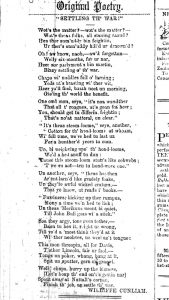In today’s poetry news round-up, we have robots being trained to write poetry! But first, we are going to take a look at an amazing discovery of 300 works from Lancashire writers and mill workers.
300 poems from mill workers in Lancashire have been rediscovered
 Research has recently unearthed 300 works from Lancashire writers and mill workers that were struggling because of the economic crisis that was caused in the 1860s because of the US civil war.
Research has recently unearthed 300 works from Lancashire writers and mill workers that were struggling because of the economic crisis that was caused in the 1860s because of the US civil war.
The poems were written between the years of 1861 and 1865, with the vast majority written by workers that had been impacted by the feminine. This treasure trove of poetry was unearthed by University of Exeter researchers.
For those who are unaware, unemployment was the fate for up to 400,000 cotton workers in the UK when the US civil war broke out. This is because it prevented cotton from reaching the northwest in England in the 1860s, which led to the mills being closed down. It was a struggle for many to put food on the table because they had no work. Many turned to poetry to document their feelings and experiences.
Here is an extract from John Plummer in a poem entitled “In A Mother’s Wail”

Here is an extract from an anonymous author in a poem entitled “In A Song of the Cotton Famine”

Will robots be the great poets of the future?
 When we look back over the years, we look to the likes of Shakespeare, Keats and Emily Dickinson for the most remarkable poet works. But in years to come, could people be accrediting robots as the best poets of the time? It’s a crazy thought, but robots are actually being trained to write poetry.
When we look back over the years, we look to the likes of Shakespeare, Keats and Emily Dickinson for the most remarkable poet works. But in years to come, could people be accrediting robots as the best poets of the time? It’s a crazy thought, but robots are actually being trained to write poetry.
The University of Toronto and researchers in Australia have been working together to create an algorithm that has the capability to produce poetry. It is a far cry from the generic rhymes you may be accustomed too. As words are weaved together, this AI will take metre into account and follow the rules. During training, the robots were fed 3,000 sonnets, and received extensive training on how to craft an acceptable poem.
Here is a sample of what was produced:



You must register to comment. Log in or Register.